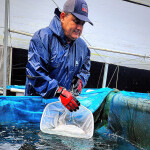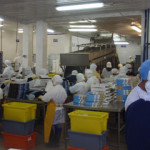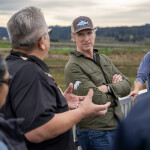Taiwanese opposition parties are protesting a ruling party rush to lift the ban on food imports from Japanese prefectures surrounding Fukushima.
The ban, preventing imports of food from Fukushima and nearby Ibaraki, Gunma, Tochigi and Chiba prefectures, was put in place in 2011 over radiation concerns, following Japan’s earthquake, tsunami and nuclear disaster. At the time, the Taiwanese government was under the administration of Ma Ying-jeou of the Koumingtang (KMT) Party.
But in May of 2015, it was discovered that many food items originating in those prefectures had been mislabeled to hide their origin and illegally imported to Taiwan. Hundreds of food items were recalled and Taiwan began requiring certificates of origin for all Japanese food imports. Some were also required to have radiation inspection certificates, including seafood products from Tokyo, Miyagi, Iwate and Ehime prefectures; tea from Tokyo, Shizuoka, Aichi and Osaka prefectures; and dairy products from Tokyo, Miyagi and Saitama prefectures. Seaweed and dairy-based baby foods are also affected.
At the time, Taiwan was the third-largest export market for Japanese food and agricultural products, after Hong Kong and the United States, with JPY 83.7 billion yen (USD 741.5 million, EUR 699.8 million) worth of shipments in 2014. Japan protested the requirement, saying that there is a difference between mislabeled food and actually dangerous or radioactive food. Taiwan implemented the rule anyway.
Since then, Japan has pressed Taiwan to lift its ban, hinting that it would take the matter to the World Trade Organization, as it has in the case of similar import restrictions imposed by South Korea.
President Tsai Ing-wen of the Democratic Progressive Party assumed office in May of this year, and the Japanese government has since brought strong pressure on the new Taiwanese government to ease the ban. The new government appears to have promised Japan to do so, in order to seal an agreement at the annual Taiwan-Japan Trade and Economic Meeting.
The cabinet proposed keeping the ban on products from Fukushima while imports from Ibaraki, Tochigi, Gunma and Chiba prefectures would be allowed after inspection. The government in early November began public hearings, as required for changes to regulations, but it did not observe the legal requirement that all such meetings be announced at least 10 days in advance, instead announcing the hearings only one or two days prior to their being held. The hearings were disrupted, sometimes violently, by opposition lawmakers and consumer safety campaigners, who overturned tables in an effort to halt the proceedings, saying that safety and public opinion were being ignored.
As a result, the government relented, and has promised not to discuss the issue at this year’s talks. Nonetheless, during his opening remarks at the opening of the talks in late November, Japan Interchange Association Chairman Mitsuo Ohashi said he hoped Taiwan would soon lift its restrictions on Japanese food products. He raised the issue in the talks, though the Taiwanese side had purposely excluded them from the agenda.
Owing to continued protests outside the venue, the Taiwanese side declined to discuss the matter during this year’s talks. Thus, the Japanese effort has failed for the current year.






